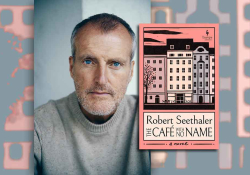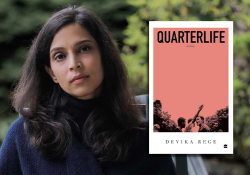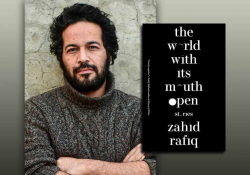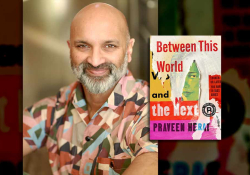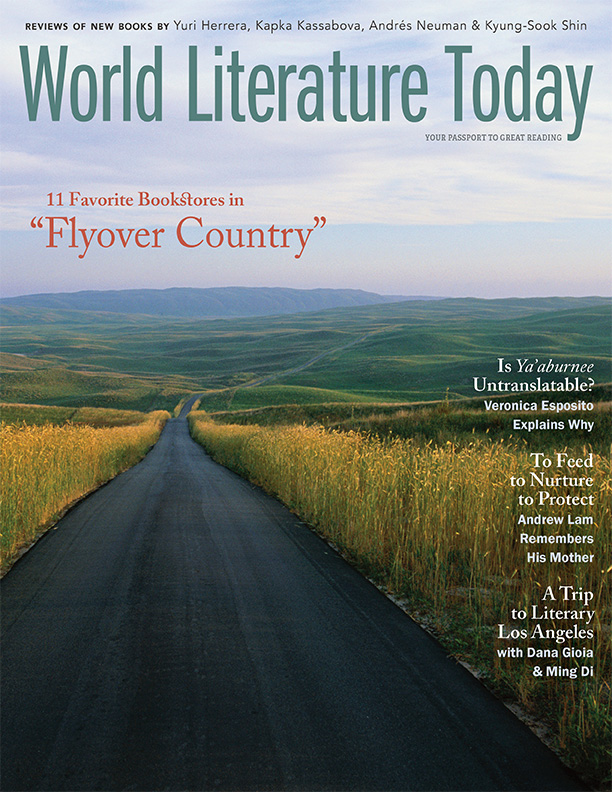7 Questions for Norman Erikson Pasaribu
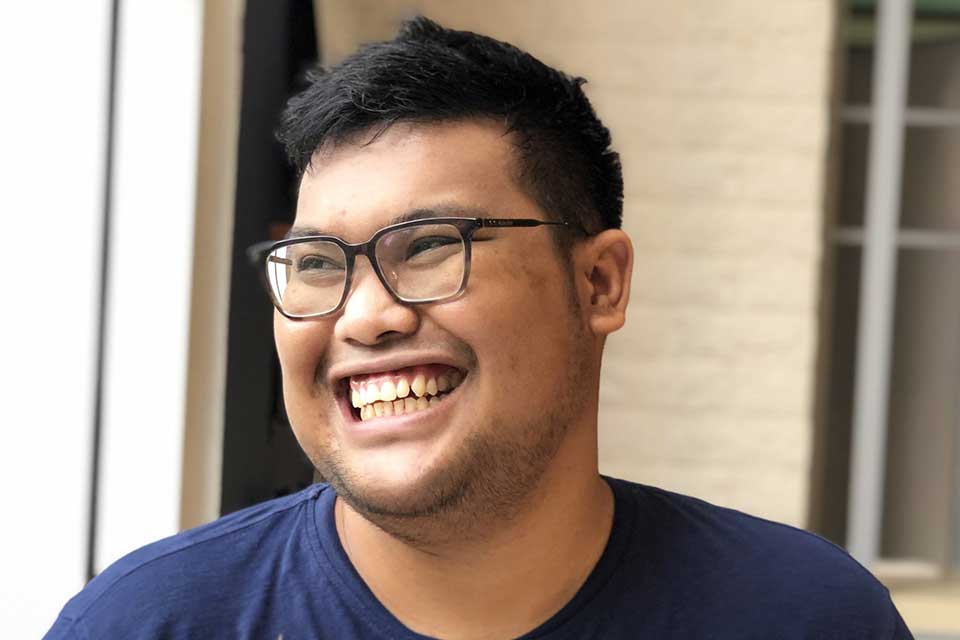 Norman Erikson Pasaribu’s first collection of short stories, Happy Stories, Mostly, was longlisted for the 2022 International Booker Prize and published, in Tiffany Tsao’s English translation, in the US by the Feminist Press in June.
Norman Erikson Pasaribu’s first collection of short stories, Happy Stories, Mostly, was longlisted for the 2022 International Booker Prize and published, in Tiffany Tsao’s English translation, in the US by the Feminist Press in June.
Q
The Booker Prize website has this wonderful line on its page about your collection: “Powerful blend of science fiction, absurdism and alternative-historical realism that aims to destabilise the heteronormative world and expose its underlying rot.” Reading these stories, I see the evidence of this. Who else in literature and culture is doing this work?
A
I have no idea. I might not be knowledgeable enough regarding this. I think I was attracted to Indonesian absurdists (like the brilliant Budi Darma) because I feel I had an absurd upbringing. But I wrote so differently from them. It goes the same with other writers I love: Herta Müller, Claudia Rankine, Mary Gordon, et al. Personally, I initially didn’t realize that I was doing something special, this thing people call “blend.” I think it’s just normal for a writer to mix stuff. If I don’t get to experiment when I write, what’s in it for me?
Q
In your conversation with translator Tiffany Tsao that concludes the book, you talk about the importance of music when you write, saying that you listened to a lot of Joni Mitchell, along with Batak pop songs from YouTube, while writing these stories. “Little Green” is the soundtrack for the story “So What’s Your Name Sandra,” so I listened to it while reading the story, adding another emotional layer. How did Mitchell come to feature so prominently in your writing soundtrack, and what are some other songs that would be on the playlist for this collection?
A
I love the color blue, so it was just natural for me, I think, to listen to an album called Blue. I discovered it when I was just out of college, during another rough patch with my parents, and I have been listening to that album—nonstop, pretty much—for a decade. I strongly hate the sound of a man shouting (even if he shouts nonviolently), and this album was an antithesis to all that. And you can feel that she was so serious with everything she said even from the way she pronounced her lyrics.
Other music that will be great company when people read the book: Amy Winehouse’s Back to Black. Viky Sianipar’s songs, especially “O Tao Toba.” Robert Plant and Alison Krauss’s Raising Sand. My boyfriend was a big fan of Utada Hikaru, so her album Fantôme, since he would put it on between my Joni.
Q
Whose work has been most essential to your development as a writer?
A
One of them is the poet Claudia Rankine. Reading Citizen and Don’t Let Me Be Lonely was transformational. She is one of the greatest poets alive. The way she switched between tones and modes of speech, the way she created a moment, the way she played with forms, the way she was continually being ruined and cured in every line she wrote just opened a whole new world of poetics for me.
Q
What else has shaped you as a storyteller?
A
Indonesia. Every single word I wrote was a response to Indonesia and Indonesians, how they continue mistreating us queers, erasing us, killing us. They punched and jabbed me again and again that my writing just can’t have a flat surface anymore. And, if I am being honest, whenever I wrote there was always a hidden motive to make my straight enemies admit their defeat. That I can be far more brilliant than them despite their lazy, intense hate.
And, in contrast, the dear friends around me, especially Tiffany Tsao, who translated my books. I heard all the funny stories about the love/hate relationship between translators and authors, but Tiffany and I just clicked. I learned so much from working with her for our previous translated book, Sergius Seeks Bacchus. A storyteller would stop telling us stories when they’ve felt unheard for too long. Whenever Tiffany sent me the first draft of the translation, I felt so seen. And this feeling of being seen, of being properly close-read, helped me keep going.
Q
What are your favorite spots in Jakarta, your birth city?
A
It’s not a “definitive” spot, but it’s the long way between Bekasi and Jakarta. I spent the first half of my twenties doing a daily commute for work from Bekasi to Jakarta, which would take around five to six hours for a round trip. I would wake up at 4:00 am so I could have a decent amount of time for breakfast while still taking the first bus at 5:10. And then I would leave the office at 5:00 pm, and I would arrive at my home at 7:30 or 8:00. During these trips, I would read on my phone or e-reader. And after I got back to my laptop, I would write or do writing exercises. Even though I often cried or even got nosebleeds during these trips, they gave me my informal MFA years. I got six hours daily distraction-free to ponder the art of writing, to be obsessed about why the first sentence of a novel or a poem was divine.
The older stories in Happy Stories, Mostly were incubated, planned, examined during these long trips.
Q
The publicity materials for this collection describe twelve stories that probe what it means to be almost happy. Why almost happy?
A
Because I am “almost happy,” because my closest queer friends are “almost happy,” because my parents and the people like them are “almost happy.” Imagine: I came from a working-class family, where I had to beg and fight with my mother every day for lunch money, and then after high school I was accepted into this prestigious accounting school in Indonesia (in 2007, only 2,014 students were accepted from more than 125,000 applicants) that would open doors to steady jobs, which eventually would give me access to a better living condition. However, not long after winning a poetry prize in Indonesia in 2015, a fellow poet outed me in his article regarding Indonesian taxation. At that time, I was also bullied by other poets on Facebook. And in only six months, I left the job that everyone around me coveted. Imagine how I felt: I was already inside the cool club! I was getting good paychecks too!
I was on my way to plan a trip to the Netherlands, where I could see the sacred sword of the last Batak king, Sisingamangaraja XII, which the Dutch stole from him when he died. But even such a little push could easily throw me back to where I started. Ruin years of hard work. Meanwhile, did anything that was equally bad, equally cruel happen to the hetero poet that outed me? Nah. In a heterosupremacist world, evil hetero people can always rebrand and redeem themselves by simply posting photos of their happy children. “Hello, world, this is me and my papa.” “I love congee for breakfast.” “First day at school!” Despite their shitty behavior, these evil hetero people, at the end of the day, will be seen as “good parents” to someone. Ugh.
Q
The range of cultural references in this collection is impressive—the work of a true cultural omnivore. What cultural offerings or trends have recently captured your attention?
A
I consumed indiscriminately. I didn’t have access to a lot of books or a library when I was small. So I had to learn to love rereading stuff, sometimes hundreds of times, to escape boredom. And I was too curious to just stop consuming. My father was a reporter, so he would bring back some newspapers every day. My formative reading material was not, in any way, “great literature.” They were so random, from the Bible to tennis news, or dating ads in newspapers. In the morning, I might find myself speculating about the idea that John the Apostle was Jesus’s secret lover, and then I would think of Maria Sharapova’s leg injury and spend the whole afternoon reading more news about Roger Federer—who was my teenage crush—and spend the rest of the night being obsessed by a carelessly photocopied confessional account of an ex-follower of a Satanic church, which I borrowed from a friend at school.
In college, I would spend nights in internet cafés just to read, listen to songs, and watch movies. My reading comprehension for English texts developed the more I read. And I learned a trick that if you disconnected from the internet fast enough, a paywall wouldn’t activate. Thus came my first encounter with great world literature. Jhumpa Lahiri’s stories, the poems of Franz Wright and Mark Doty (I saw the latter in person in 2017, at a poetry festival in Brisbane, Australia, and he was as magnetic as I imagined him to be). And then came the books of Orhan Pamuk, Herta Müller, William Trevor, Banana Yoshimoto, Sharon Olds, among many others. When I was nineteen, I was so obsessed with Ha Jin’s story “The House Behind a Weeping Cherry” in the New Yorker that I printed it and brought it everywhere with me.
If I can recommend an Indonesian poet, it will be Ni Made Purnama Sari, who I recently translated for the Cordite Poetry Review in Australia. Purnama writes poems not to become a sastrawan, as Indonesian writers would say, but to witness how the world, our world, slowly vanishes into nothingness as we take its beauty for granted. In her poems, I found a lot to admire and ponder about.
Norman Erikson Pasaribu is a Toba Batak writer of fiction, poetry, and nonfiction. Their collection of stories Happy Stories, Mostly won the 2022 Republic of Consciousness Prize and was longlisted for the 2022 International Booker Prize.





